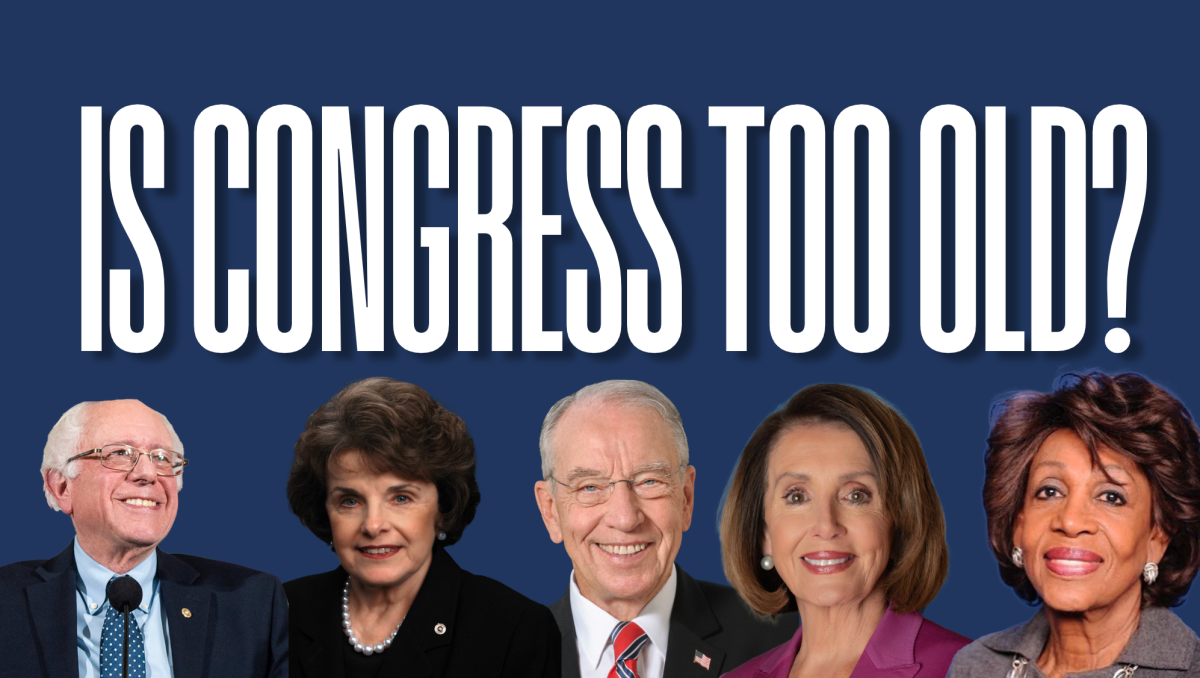The average American is 39.1 years old. This statistic should not be so surprising. We are living much longer than the generations before us and — with technological advances — are able to sustain life through disease and severe injury. When we think of our elected officials, it is rare that they are not gray-haired or wrinkled, and they seem to represent a demographic much older than us. Well, if you have noticed this trend, you are not wrong; the average age of a member of Congress is 58.9 years old. This might not make it seem like Congress is too old because many functioning, able-bodied adults work into their late sixties and seventies. But when those people are making laws and voting on policies that affect young people, we may ask ourselves if this is the best representation possible. For senators and representatives who are around 80 years old, the reliability of their mental state may be called into question. Congress should be held accountable, regardless of their age, to remain mentally competent in order to effectively serve their constituents.
For example, Dianne Feinstein was the oldest sitting senator before she died in office, forcing California Governor Gavin Newsom to scramble to find a replacement for her. Feinstein was a groundbreaking senator for many years and made landmark achievements, including becoming the first female mayor of San Francisco and the first female senator from California, financing for breast cancer research and supporting policy on gun control. She passed away in September of 2023 at 90 years old. At the time of her death she remained an active member of the Senate, even after being asked to step down because of absences and health concerns in 2023.
In her place, Governor Gavin Newsom appointed Laphonza Butler. She is only 46 years old and her youth may make her more responsive to a younger constituency. During her time in office, Butler sponsored the Workforce of the Future Act of 2024 and the Generation Now Workforce Representation Act of 2024, both of which are specifically aimed at helping and protecting young people in America. That is not to say Feinstein did not promote helping young people, but as she aged she was less connected to the lived experiences and struggles of young people in America. In my opinion, this is why it is so important we have an even balance of ages to represent all voters in America. Feinstein is simply one example of why having no limit on the age of members of Congress might be problematic.
Another consequence of the representation gap in Congress is the difference in priorities between elderly members of Congress and young constituents. For example, a low federal minimum wage and the rising costs of higher education were both very important issues for young people in the 2024 election. Little legislation has been introduced that addresses these issues. The College for All Act of 2023, which aimed to expand Pell Grants by allowing their use for housing and meals, and make “Dreamers” eligible for aid, would have been life-changing for thousands of students — but it only made it to the introduction phase. Part of the reason may be that with the average age of Congress being so high, many members are disconnected from the struggles young people face when it comes to affording and accessing higher education.
There are a few ways to mediate the representation gap in Congress. An age limit or term limit on candidates is an option, but this may be perceived as ageist if it were ever put into practice. And there are many older senators who are in no way mentally impaired, but for those in Congress over 80 years old it may be necessary to institute some form of test on their mental states. A cognitive exam could be put into place, similar to at the DMV. In New York, if the DMV has “reasonable grounds” for a re-evaluation of your driver’s license, the DMV can require you to submit to an examination to determine your qualifications. In my opinion, the same standards should apply to members of Congress. I believe that to represent U.S. citizens, you should be required to have a cognitive examination from a medical professional that ensures you are mentally capable of carrying out the duties of your elected office. This requirement would only be necessary if concerns were raised by the public or by staff about a member’s ability to fulfill their responsibilities. There could be a cognitive requirement for members of Congress to ensure that those making decisions for the future of the country are mentally sharp enough to understand and address the challenges of the present. At a certain age, this seems necessary both to make sure citizens are voting for someone who is mentally competent and to slowly lower the representation gap.
The problem with an aging Congress is that it fails to address the young people who want to be represented by someone closer to them in age and those with concerns about the mental fitness of elderly members of Congress. Is there anything we can do? Well, of course, there is the obvious solution that we are reminded of every election cycle: vote! If more and more young people vote, the more we will see our voices represented in Congress and in the legislation that is passed. I understand the frustration of constantly seeing the news that reminds us of how ridiculous our government is. But we can’t give up on our future simply because we are disappointed by the present.
Uma Petzke, FCRH ‘29, is a psychology major from San Francisco, CA.










































































































































































































